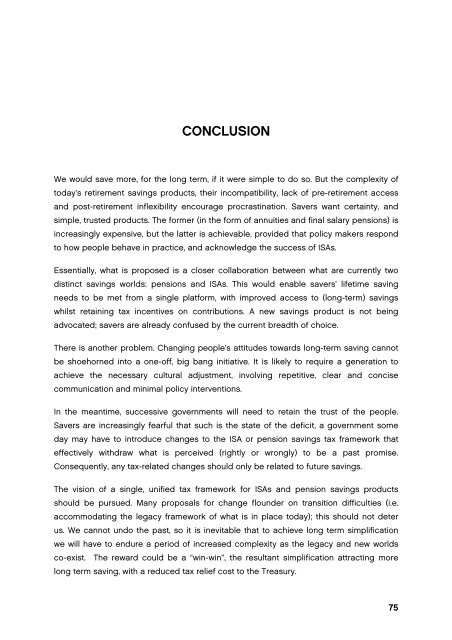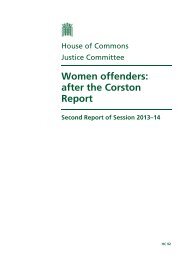Simplification is the key - Centre for Policy Studies
Simplification is the key - Centre for Policy Studies
Simplification is the key - Centre for Policy Studies
Create successful ePaper yourself
Turn your PDF publications into a flip-book with our unique Google optimized e-Paper software.
CONCLUSION<br />
We would save more, <strong>for</strong> <strong>the</strong> long term, if it were simple to do so. But <strong>the</strong> complexity of<br />
today’s retirement savings products, <strong>the</strong>ir incompatibility, lack of pre-retirement access<br />
and post-retirement inflexibility encourage procrastination. Savers want certainty, and<br />
simple, trusted products. The <strong>for</strong>mer (in <strong>the</strong> <strong>for</strong>m of annuities and final salary pensions) <strong>is</strong><br />
increasingly expensive, but <strong>the</strong> latter <strong>is</strong> achievable, provided that policy makers respond<br />
to how people behave in practice, and acknowledge <strong>the</strong> success of ISAs.<br />
Essentially, what <strong>is</strong> proposed <strong>is</strong> a closer collaboration between what are currently two<br />
d<strong>is</strong>tinct savings worlds: pensions and ISAs. Th<strong>is</strong> would enable savers’ lifetime saving<br />
needs to be met from a single plat<strong>for</strong>m, with improved access to (long-term) savings<br />
whilst retaining tax incentives on contributions. A new savings product <strong>is</strong> not being<br />
advocated; savers are already confused by <strong>the</strong> current breadth of choice.<br />
There <strong>is</strong> ano<strong>the</strong>r problem. Changing people’s attitudes towards long-term saving cannot<br />
be shoehorned into a one-off, big bang initiative. It <strong>is</strong> likely to require a generation to<br />
achieve <strong>the</strong> necessary cultural adjustment, involving repetitive, clear and conc<strong>is</strong>e<br />
communication and minimal policy interventions.<br />
In <strong>the</strong> meantime, successive governments will need to retain <strong>the</strong> trust of <strong>the</strong> people.<br />
Savers are increasingly fearful that such <strong>is</strong> <strong>the</strong> state of <strong>the</strong> deficit, a government some<br />
day may have to introduce changes to <strong>the</strong> ISA or pension savings tax framework that<br />
effectively withdraw what <strong>is</strong> perceived (rightly or wrongly) to be a past prom<strong>is</strong>e.<br />
Consequently, any tax-related changes should only be related to future savings.<br />
The v<strong>is</strong>ion of a single, unified tax framework <strong>for</strong> ISAs and pension savings products<br />
should be pursued. Many proposals <strong>for</strong> change flounder on transition difficulties (i.e.<br />
accommodating <strong>the</strong> legacy framework of what <strong>is</strong> in place today); th<strong>is</strong> should not deter<br />
us. We cannot undo <strong>the</strong> past, so it <strong>is</strong> inevitable that to achieve long term simplification<br />
we will have to endure a period of increased complexity as <strong>the</strong> legacy and new worlds<br />
co-ex<strong>is</strong>t. The reward could be a “win-win”, <strong>the</strong> resultant simplification attracting more<br />
long term saving, with a reduced tax relief cost to <strong>the</strong> Treasury.<br />
75

















